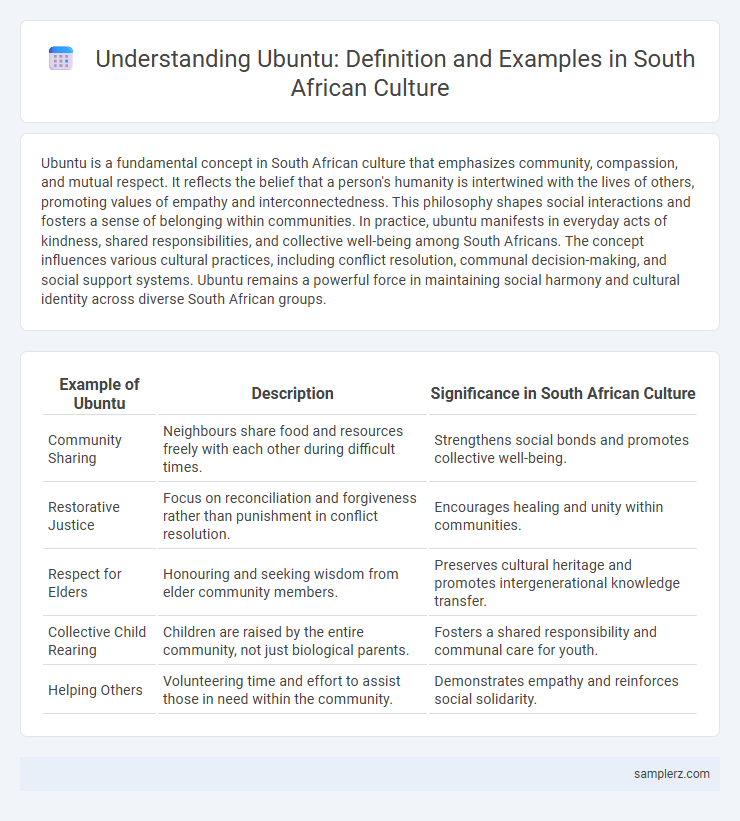Ubuntu is a fundamental concept in South African culture that emphasizes community, compassion, and mutual respect. It reflects the belief that a person's humanity is intertwined with the lives of others, promoting values of empathy and interconnectedness. This philosophy shapes social interactions and fosters a sense of belonging within communities. In practice, ubuntu manifests in everyday acts of kindness, shared responsibilities, and collective well-being among South Africans. The concept influences various cultural practices, including conflict resolution, communal decision-making, and social support systems. Ubuntu remains a powerful force in maintaining social harmony and cultural identity across diverse South African groups.
Table of Comparison
| Example of Ubuntu | Description | Significance in South African Culture |
|---|---|---|
| Community Sharing | Neighbours share food and resources freely with each other during difficult times. | Strengthens social bonds and promotes collective well-being. |
| Restorative Justice | Focus on reconciliation and forgiveness rather than punishment in conflict resolution. | Encourages healing and unity within communities. |
| Respect for Elders | Honouring and seeking wisdom from elder community members. | Preserves cultural heritage and promotes intergenerational knowledge transfer. |
| Collective Child Rearing | Children are raised by the entire community, not just biological parents. | Fosters a shared responsibility and communal care for youth. |
| Helping Others | Volunteering time and effort to assist those in need within the community. | Demonstrates empathy and reinforces social solidarity. |
Defining Ubuntu: Core Principles in South African Culture
Ubuntu in South African culture embodies the core principles of humanity, compassion, and interconnectedness, emphasizing that a person is defined through their relationships with others. This philosophy promotes communal support, shared responsibility, and mutual respect, fostering social cohesion and harmony within diverse communities. Rooted in African traditions, Ubuntu highlights the collective identity over individualism, reinforcing values of empathy and unity essential to South Africa's cultural fabric.
Historical Roots of Ubuntu in South Africa
Ubuntu, a Nguni Bantu term meaning "humanity," has deep historical roots in South African culture as a philosophy emphasizing communal unity, compassion, and mutual respect. Originating from indigenous African traditions, Ubuntu shaped social structures by promoting interconnectedness and collective well-being in tribal communities long before colonial influence. This cultural framework continues to influence South African identity and reconciliation efforts, reflecting core values of empathy and shared humanity.
Ubuntu in Community Life: Shared Responsibilities
Ubuntu in South African culture emphasizes the interconnectedness of individuals through shared responsibilities within communities. This philosophy fosters mutual support, collective decision-making, and a sense of belonging that strengthens social cohesion. Practices such as communal caregiving, conflict resolution, and resource sharing illustrate Ubuntu's role in sustaining harmonious community life.
Family Structures Shaped by Ubuntu Values
Ubuntu in South African culture deeply influences family structures by emphasizing interconnectedness, compassion, and collective well-being. Families often function as extended networks where support, respect, and shared responsibilities are central, reflecting the philosophy of "I am because we are." This approach fosters strong communal bonds and nurtures resilience through mutual care and cooperation.
Ubuntu in Traditional Ceremonies and Rituals
Ubuntu in South African traditional ceremonies and rituals embodies interconnectedness and communal harmony, emphasizing collective responsibility and mutual respect. During rites such as weddings, funerals, and initiation ceremonies, Ubuntu encourages sharing, support, and the reinforcement of social bonds among community members. This philosophy fosters reconciliation, unity, and the preservation of cultural identity through shared experiences and collective participation.
Ubuntu and Conflict Resolution Practices
Ubuntu, a core principle in South African culture, emphasizes interconnectedness and mutual respect, promoting harmony and collective well-being. In conflict resolution practices, Ubuntu encourages dialogue, empathy, and restorative justice, prioritizing reconciliation over punishment. Community gatherings often facilitate open communication, helping parties restore relationships and maintain social cohesion.
Ubuntu’s Role in Social Welfare and Support Systems
Ubuntu in South African culture underpins social welfare by emphasizing communal responsibility and collective well-being, where individuals prioritize the needs of the community over personal gain. This philosophy strengthens support systems by fostering empathy, cooperation, and mutual aid, crucial for addressing poverty, health challenges, and social inequalities. The social cohesion promoted by Ubuntu is integral to grassroots initiatives and government programs aimed at improving quality of life and social justice in South Africa.
Ubuntu in Leadership and Governance
Ubuntu in South African leadership emphasizes communal responsibility, empathy, and collective well-being, fostering inclusive decision-making that strengthens social cohesion. Leaders guided by Ubuntu prioritize restoring harmony and nurturing relationships, promoting ethical governance rooted in mutual respect and interconnectedness. This approach counters authoritarian styles by valuing collaboration and shared humanity as foundational principles in governance.
Ubuntu Reflected in South African Proverbs and Language
Ubuntu, a core philosophy in South African culture, is vividly reflected in proverbs like "Umuntu ngumuntu ngabantu," meaning "A person is a person through other people," emphasizing interconnectedness and mutual respect. The language captures the essence of community, compassion, and shared humanity, illustrating how individual identity is deeply tied to the collective well-being. These expressions serve as cultural anchors that promote social harmony and collective responsibility within diverse South African societies.
Modern Applications of Ubuntu in Urban Communities
Ubuntu, a foundational African philosophy emphasizing interconnectedness and mutual respect, thrives in South African urban communities through initiatives promoting social cohesion and cooperative economic development. Modern applications manifest in community-driven projects like cooperative housing, shared urban gardens, and social entrepreneurship ventures that prioritize collective well-being over individual profit. These practices reinforce Ubuntu's values by fostering inclusive partnerships, reducing social inequalities, and enhancing communal resilience in diverse metropolitan settings.

example of ubuntu in South African culture Infographic
 samplerz.com
samplerz.com